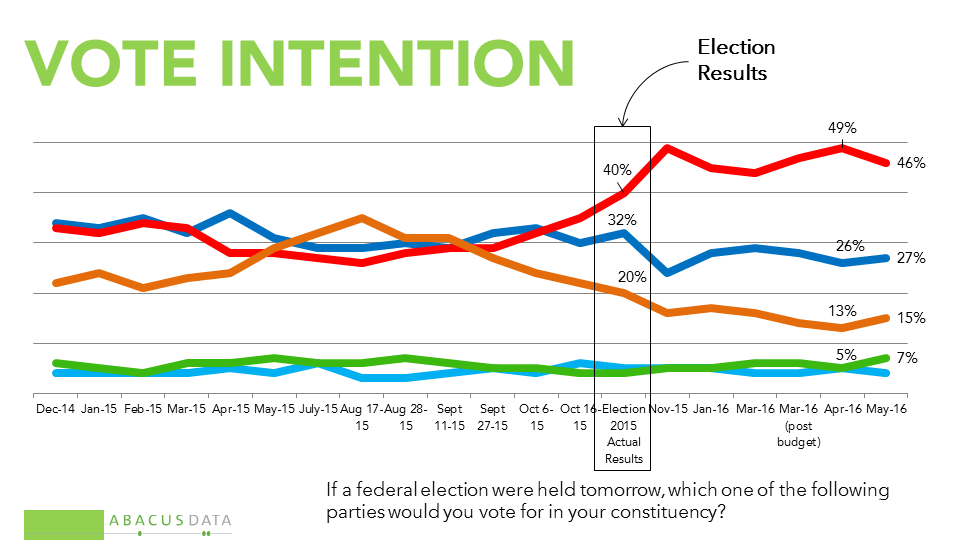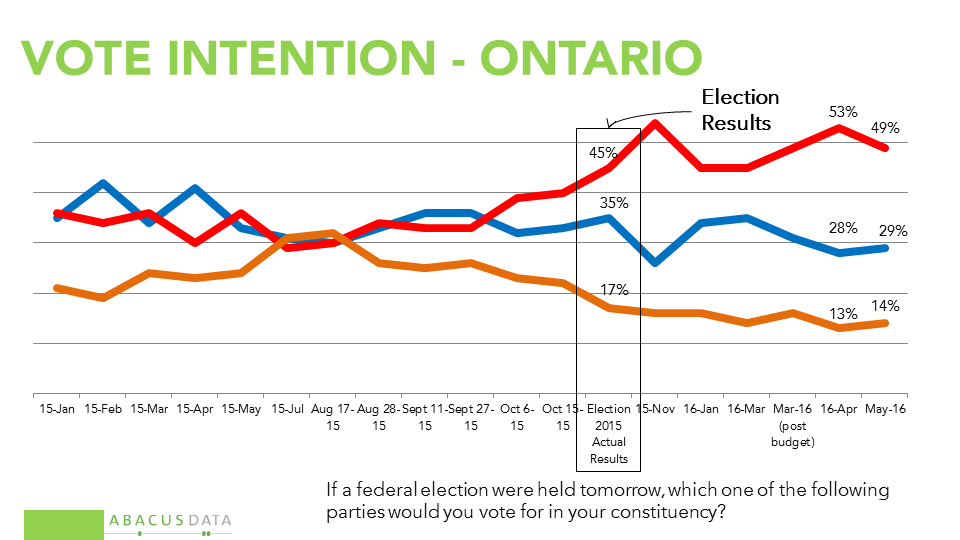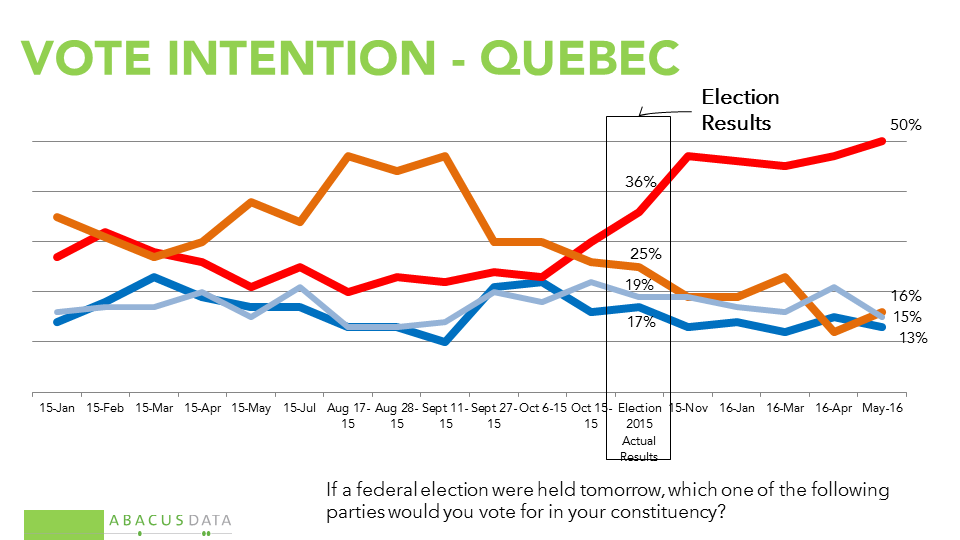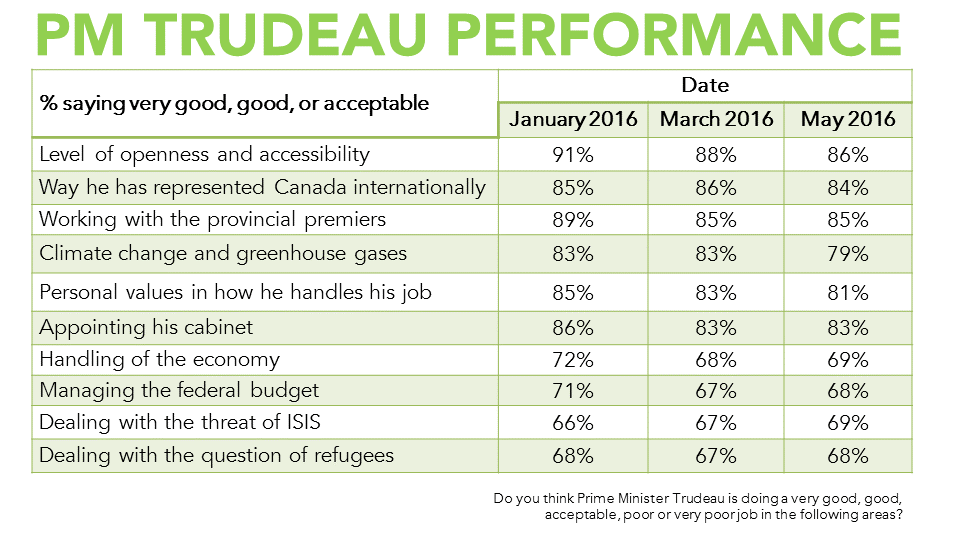Regrets about the Liberal win? So far, voters have few.
May 24, 2016

Six months have passed since the last federal election, and voters have had a chance to know more about the people they put in office and assess the government’s performance.
Here’s what our latest political mood data looks like:
• 46% say they’d vote Liberal tomorrow, 27% Conservative and 15% NDP. That’s an improvement over the election outcome for the Liberals and a falling back for the other two main parties.




• In Ontario, the Liberals won by 10 points over the Conservatives, and 28 points over the NDP. Today they are 20 points ahead of the Conservatives and 35 points ahead of the NDP.
• In BC, the Liberals won by 5 points over the Conservatives, and 9 points over the NDP. Today they are 13 points ahead of the Conservatives and 31 points ahead of the NDP.

• In Quebec, the Liberals won by 11 points over the NDP, and 19 points over the Conservatives, and 17 over the BQ. Today they are 37 points ahead of the Conservatives and 34 points ahead of the NDP, 35 points ahead of the BQ.

• 55% say they have a positive view of Prime Minister Trudeau, basically unchanged since November, and up 11 points since the final weekend of Election 2015. 25% have a negative view of the PM. For additional context, Stephen Harper averaged about 35% positive views during his last year in office.

• 30% have a negative view of Tom Mulcair, compared to 26% who have a positive view. This is the first time those lines have crossed, and negative views of Mr. Mulcair are more numerous than positive feelings.

• Among Quebec voters, Mr. Trudeau enjoys positive views among 62%, compared to 35% who express a positive feeling for Mr. Mulcair.




• 19% have a positive view of Interim Opposition Leader Rona Ambrose, and 23% have a negative view. Ms. Ambrose’s positives are up 5-points since November while were negatives are down three since January 2016. Among CPC voters, 49% have a positive view of Ms. Ambrose.


• Approval of the performance of the government is running at 54%. It has been steady in the 51% to 54% range since the election. 27% disapprove of the Trudeau government performance, unchanged from March and up 8 since November 2015.
• A majority approve of the government’s performance in four provinces/regions – Atlantic, Quebec, Ontario and BC, while 48% approve in Manitoba and Saskatchewan. Alberta is the only region where more people disapprove than approve of the government’s performance.



• Detailed approval ratings for Mr. Trudeau reveal his strongest positives remain the way he represents Canada internationally, the sense of openness and accessibility he projects, and the personal values people see him bringing to the job of PM. In each case 80% or more say he is doing an acceptable or better job.
• Mr. Trudeau’s weakest ratings are for his handling of economic and fiscal, refugee and ISIS issues. In no case, does the number of people saying he is doing a poor job exceed 32%.

• We last tested these impressions of the performance of the government in March and January. Since March, only one item shifted more than a normal margin of error for a sample this size: today on “climate change and greenhouse gases” good and acceptable ratings stand at 79%, compared to 83% in March.

• In this wave, we also compared the 18% of Canadians who self-identified as “news junkies” and the 32% who say they either follow major news events only or are not interested in following the news at all (we term them low information Canadians). For seven of the nine measures, the difference between news junkies and low information Canadians was three points or less. There was a noticeable difference when it comes to ratings of Mr. Trudeau on managing the budget, handling of the economy, and dealing with the threat of ISIS. In all three cases, low information voters were more likely to rate the Prime Minister’s performance as acceptable or better than news junkies.

THE UPSHOT
The government has had a Throne Speech, a budget, and has for some time faced opposition grilling in the House of Commons. When we consider that only 40% marked a ballot for the Liberal Party, the patterns of opinion continue to show that while the government may not be pleasing everyone, it has certainly not annoyed very many, so far.
According to Bruce Anderson:
“The consistency of these patterns suggest that Mr. Trudeau’s opponents will struggle if they focus their attacks on his international visibility or personal values. In many ways, Mr. Trudeau’s success in the polls continues to rest on perceptions that he is different from the politicians that preceded him. As long as that view persists, attacking him in traditional ways finds limited traction.
For a couple of years, his critics have told voters that Mr. Trudeau is self-absorbed and incompetent. But voters seem to think he has a good grasp of the issues, including the most difficult ones, and is making choices he feels are in the best interests of the country.
As the other parties start leadership renewal processes, this puts a premium on looking hard for those who can fashion and market better ideas than those of Mr. Trudeau and the Liberals – rather than relying too much on anger with incumbents to propel them to success.”
Methodology
Our survey was conducted online with 2,000 Canadians aged 18 and over from May 17 to 20, 2016. A random sample of panelists was invited to complete the survey from a large representative panel of over 500,000 Canadians.
The Marketing Research and Intelligence Association policy limits statements about margins of sampling error for most online surveys.
The margin of error for a comparable probability-based random sample of 2,000 is +/- 2.2%, 19 times out of 20. The margin of error of for a comparable probability-based random sample of 1,367 interviews is +/- 2.7%, 19 times out of 20. The margin of error for a comparable probability-based random sample of 633 interviews is +/- 4.0%, 19 times out of 20.
The data were weighted according to census data to ensure that the sample matched Canada’s population according to age, gender, educational attainment, and region. Totals may not add up to 100 due to rounding.
Abacus Data Inc.
We offer global research capacity with a strong focus on customer service, attention to detail and value added insight. Our team combines the experience of our Chairman Bruce Anderson, one of Canada’s leading research executives for two decades, with the energy, creativity and research expertise of CEO David Coletto, PhD.
Abacus Data also runs http://www.canadianmillennials.ca, the most comprehensive online resource for data and insights on Canada’s millennial generation. David Coletto regularly speaks to groups about the topic. He is now booking speaking engagements for for 2017. Contact him at david@abacusdata.ca for more information.




